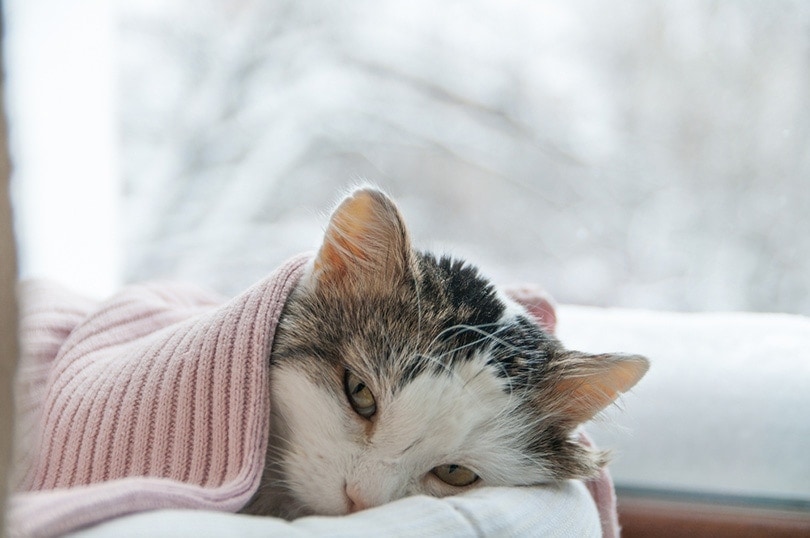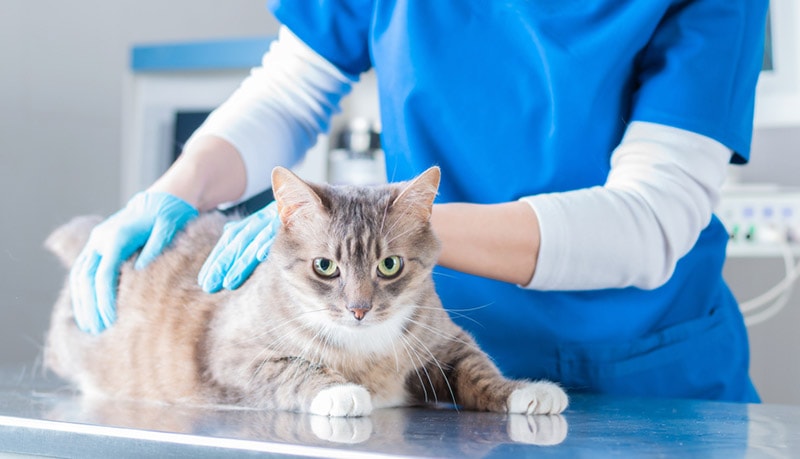
Households with gardens and plants might have heard of the frosty fern, which is a popular plant sold during the Christmas season. These plants are delicate, light green plants with sprouts that give them their frosted, snowy appearance. While cat owners may worry about their cats chewing on or eating these beautiful holiday plants, thankfully, frosty ferns are not toxic to cats!
Still curious about the frosty fern’s effect on your cat? Read on as we discuss this in detail!
What Are Frosty Ferns?
Frosty ferns (Selaginella kraussiana) are low-growing, mound-like plants that grow up to a foot tall, but can spread both horizontally and vertically. They are easily mistaken as ferns because of their name, but frosty ferns are actually a type of spike moss. These plants also propagate through spores rather than seeds.
The frosty fern has white sprouts on their leaves, giving its association with the winter season. Because of this, the frosty fern has become a popular plant for the holiday season!
Are Frosty Ferns Harmful to Cats?
According to the American Society for the Prevention of Cruelty to Animals (ASPCA), frosty ferns are not dangerous or toxic to cats.1 While they are listed as safe for cats, it is important to understand that frosty ferns are not usually consumed by cats.
Cats are obligate carnivores, and while minimum amounts of leaves and vegetables are safe for them to consume, it is not part of their normal diet. Frosty ferns may be harmless to cats, but excess consumption can lead to digestive issues.
As a cat owner, you don’t have to worry about receiving frosty ferns as gifts during the holidays. As cats are curious creatures, they may nibble on the leaves as part of their curiosity. Just make sure they don’t make a habit of eating too much frosty fern to avoid any stomach problems!

Are Frosty Ferns Harmful to Other Pets?
While the ASPCA tagged frosty ferns as safe for cats, what about for other pets? The ASPCA also considers frosty ferns as safe and non-toxic to dogs and horses. Similar to cats, it’s best to keep both dogs and horses from eating large amounts of frosty ferns, as excess consumption of unusual foods may lead to digestive issues.
What Are the Signs of Poisoning in Cats?
Should your cat ingest an unfamiliar plant or substance, it is important to look out for any signs of poisoning. While the signs and symptoms that your cat exhibits vary depending on what was ingested, some general signs to look out for include:

What to Do if Your Cat is Experiencing Signs of Poisoning
Should you observe any signs mentioned above, you should seek medical help from your veterinarian immediately. Signs of poisoning tend to appear suddenly, and even if you only suspect that your cat has swallowed or touched something poisonous, it is important to act quickly.
Attempt to retrace your cat’s steps to determine if anything unwanted or unfamiliar was indeed eaten. Inspect your cat’s surroundings to see if there are any strange plants, objects, or foods that they may have mistakenly consumed. Take a sample of the poison or clear pictures of whatever plants or objects they may have consumed to show your veterinarian during the consultation. It is important not to purposefully attempt to make your cat vomit whatever they ingested and you should not try and treat your cat’s symptoms yourself unless directed by your veterinarian.
Should you identify the culprit that your cat may have ingested, be sure to keep it out of reach from your cat and other pets to prevent any unwanted accidents in the future.
When you reach your veterinarian, carefully explain what your cat is exhibiting and the possible culprits of what may be causing these signs. From here, your veterinarian may provide you with a plan of action and have your cat undergo a series of tests. They can also provide you with recommendations for medical management.

What Other Plants Are Poisonous or Toxic to Cats?
While frosty ferns are harmless for cats, there are some common plants and flowers that are considered toxic to cats and may cause many undesired effects, such as vomiting, diarrhea, skin irritation, internal organ failure, seizures, and in worse cases, even death.
Some common plants that are considered harmful for cats include:
The list goes on, as there are many more plants that are harmful to cats. But just because they are considered harmful does not mean cat owners are not allowed to own these plants and flowers in their garden. Cats are obligate carnivores that typically do not eat plants to begin with.
To prevent any accidents of poisoning from plants, it is best to keep an eye out for your cat and keep these plants out of reach.

 Final Thoughts
Final Thoughts
Cat owners who enjoy owning plants may worry about their cats eating something they’re not supposed to. Frosty ferns are a popular plant to have during the holiday season—and lucky for both cats and cat owners, they are completely harmless and non-toxic to cats and other pets. During the Christmas season, cat parents need not worry about owning a few frosty ferns to share the holiday spirit with their fur babies!
Although harmless, cat parents must still be mindful of what their cat is eating. Frosty ferns may not cause any poisoning to your cat, but excessive consumption of this unusual food may lead to stomach issues.
- Related Read: Is Pilea Toxic to Cats?
Featured Image Credit: Amelia Martin, Shutterstock







